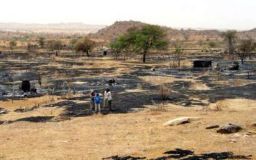Mass displacements, crop destruction continue in Sudan’s Darfur – UN
Dec 1, 2005 (KHARTOUM) — Thousands of Sudanese continue being displaced by Darfur’s raging conflict and wide-scale crop destruction is threatening food production in the volatile western region, the United Nations said Thursday.
 The bleak report by the United Nations cast a worrying shadow over the latest round of African Union-brokered negotiations between Darfur rebels and the Sudanese government which resumed Tuesday in Nigeria.
The bleak report by the United Nations cast a worrying shadow over the latest round of African Union-brokered negotiations between Darfur rebels and the Sudanese government which resumed Tuesday in Nigeria.
U.N. spokeswoman Radhia Achouri said mid-November fighting in South Darfur state forced “up to 15,000 people” to flee to the town of Gereida.
An expected 80% increase in agricultural output “may well be largely offset by the widespread phenomenon of crops being deliberately destroyed by nomadic groups and their livestock,” a U.N. report also said.
In September, the number of people needing humanitarian assistance peaked at almost 3.5 million people, while the number of Sudanese internally displaced by the conflict remained at 1.8 million, according to figures released by the U.N.’s Office for the Coordination of Humanitarian Affairs.
The increase in those needing aid coincided with the height of the region’s rainy season, when humanitarian needs and insecurity are at their highest.
“From a humanitarian perspective, the most worrisome element of the security concerns was the resurgence of militia attacks on villages,” the United Nations said in a statement.
During September, UN accessibility in Darfur dropped to 70% overall, the lowest rate since April 2004, particularly in West Darfur states where all roads out of the capital, Geneina, have been declared “U.N. no-go,” a U.N. report said.
Despite more than a year of negotiations, the government and rebel groups have continued fighting in Darfur, where over 180,000 people have died and 2 million people been forced to flee their homes into neighboring Chad or elsewhere in Sudan.
The seventh round of peace talks aims to forge consensus on how to run Darfur over the long-term, focusing on power and wealth sharing, as well as security arrangements, including thorny issues such as the disarmament of rebels and militia groups.
A split in the larger rebel group, the Sudanese Liberation Movement, has been blamed for an upsurge in violence in Darfur and had proved an obstacle during the last round of AU-mediated talks, which ended in October.
But in a positive sign, the leaders of both SLA factions — Minni Minnawi and Abdel Wahid Nur — are in the Nigerian capital, Abuja, for the talks.
Meanwhile in London, the United Nations High Commissioner on Refugees said it is cutting back aid to displaced Sudanese in Darfur and Chad because of a lack of funds.
Craig Sanders, head of UNHCR’s desk for Chad and Darfur, said Darfur’s violence is becoming more sophisticated, where rebel groups are burning empty and half-abandoned villages, bringing camel and cattle herds into reclaimed villages to destroy crops before they can be harvested, and targeting the 7,700 peacekeepers in the area.
In the UNHCR’s 12 refugee camps in neighboring Chad, where 212,000 Sudanese have fled to escape fighting that erupted in Darfur in early 2003, hospitality is wearing thin as the refugees compete with local communities for water and firewood in the remote desert near the country’s eastern border.
“We are very, very concerned,” Sanders told reporters.
Providing aid to refugees in Sudan and Chad is one of the most expensive humanitarian operations currently under way, and funding is getting scarcer, he said.
In early 2003, rebels from ethnic African tribes launched a large-scale conflict against the Arab-dominated central government over accusations of neglect.
The government is accused of unleashing Arab militias known as Janjaweed to murder and rape civilians and destroy villages. The government denies links to the Janjaweed.
(AP/ST)
